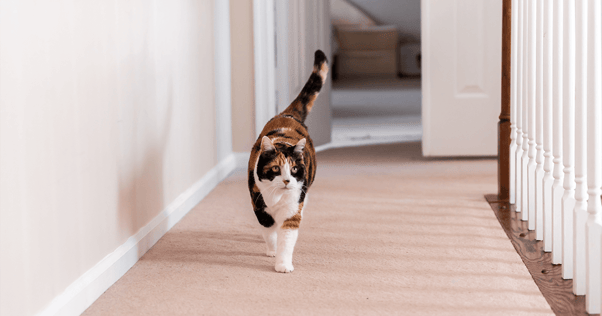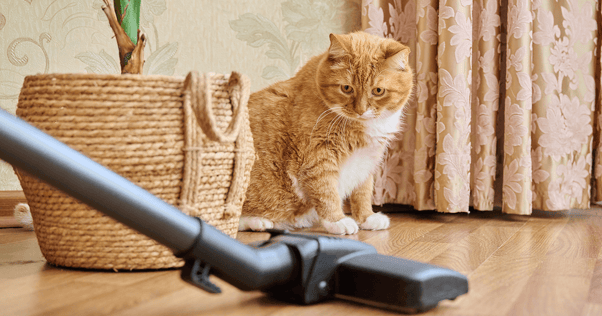Do Cats Need Routine? Tips For A Happy Cat
We all benefit from a certain level of predictability in our daily lives, and our feline friends are no different. In fact, they thrive on it! Cats are creatures of habit. While they’re adaptable as a species, they can also be sensitive to alterations in their environment and changes can often be a source of stress or cat anxiety. So, how can we help to maintain your cat’s routine? First up, let’s explore why routine is so important before sharing a few tips to keep your feline content.
The Nature of Cats: Hunting Patterns in the Wild
Long before they became our beloved household companions, cats were solitary predators with their days revolving around hunting and protecting their territory. Maintaining territory was of particular importance because having a well-defined space to roam would essentially guarantee plenty of meals. As such, a cat’s routine would involve daily territory marking and ensuring the environment was predictable and secure.

Why Routine Matters
The domestic cats we live with today still possess much of these same habits as their wild ancestors. Routine instils a sense of safety and predictability, and without it, our feline friends can often display signs of cat stress. This can manifest in a number of ways including urine spraying, scratching furniture, or hiding. By maintaining a routine, you can not only prevent these behaviours but also ensure your cat feels safe and valued.
It’s also worth noting that cats are very good at concealing distress. If you do notice any cat anxiety symptoms, it’s possible your cat will have already been feeling stressed for some time. With this in mind, it’s best to ensure your cat has a solid routine right from the off! Likewise, if you notice any signs of cat stress, it’s always best to speak to your vet. There may be other underlying causes for any changes in your cat’s behaviour that a vet will be best placed to advise on.
What Makes A Good Cat Routine?
So, how can we ensure our cats have a good routine? The simplest way is to break this down into several key stages:
- Feeding Schedule – In the wild, cats would eat multiple small meals throughout the day. By dividing their daily food ration into portions and using puzzle feeders, you can mimic this natural feeding pattern. This can also be a great way to provide mental stimulation, reducing boredom and mimicking the challenge of hunting.
- Playtime – Play is an excellent outlet for our domestic cats. Aligning with their crepuscular nature, use toys that trigger their natural hunting habits during dawn and dusk.
- Grooming – Grooming is more than just keeping clean; it’s a daily ritual that begins as early as kittenhood! Regular grooming sessions can be therapeutic for both cats and humans, building bonds and ensuring your cat’s coat and skin remains in optimal condition.
- Rest and Sleep – Sleep is a vital part of a cat’s routine. Ensure they have various resting spots to choose from throughout the day. Whether they prefer a sunny spot in the morning or a cosy corner in the evening, giving them options boosts a cat’s sense of control.
- Scratching – Scratching is a natural behaviour that helps to keep a cat’s claws in good condition. Rather than discouraging scratching, which could potentially lead to cat anxiety and stress, it’s important to provide the right sort of post or object for your cat to use. What works for each cat can be different, however, so spend time watching them to understand their preferences. Do they like to scratch against something horizontal or vertical, use it for stretching, and what material do they prefer?
- Watching the World – High vantage points, like windowsills or cat towers, allow cats to survey their territory, echoing the behaviour of their wild ancestors.
- Time with You – Whether it’s snuggling, playing, or even training, cats cherish your time together! Just remember that these interactions vary based on each cat’s personality, so work out what your cat enjoys most and don’t force them to do anything they’re not interested in.
Adapting to Changes in Routine
A cat’s routine is essential, but flexibility is also key. If a slight alteration occurs, like a delay in feeding, most cats will cope as long as the core elements of their routine remain intact. If you anticipate bigger disruptions, it’s best to introduce changes gradually. For instance, if your cat gets startled by the vacuum cleaner, using it at predictable times can help your cat to anticipate and adapt.

For those moments of unavoidable stress, FELIWAY Optimum can offer a great solution. This diffuser releases calming pheromones into the air to provide serenity throughout your home. For the best results, simply plug FELIWAY Optimum into an electrical socket in the room your cat uses most.
Would you like to learn more about recognizing cat anxiety symptoms or are interested in finding more tips to help with your cat’s routine? We’d love to hear from you and share all the advice we can! You can also stay informed with all our latest tips and FELIWAY product advice by signing up to our newsletter.
